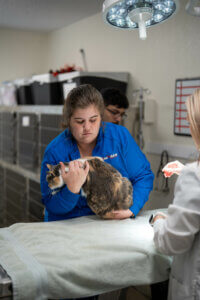Looking for a cat vet in Brooksville?
Cats are not just small dogs. They have different needs and behaviors from dogs. They have different lifestyles (indoor vs outdoor) and different requirements for preventative measures because of their varying lifestyles. Preventative measures such as vaccinations, heartworm, flea and tick preventatives, surgical procedures, laboratory screenings, and dental prophylaxis are areas that we can improve their quality of life.
Vaccinations
We recommend a reduction in the frequency of vaccinations as the cat ages. Cats require different vaccination protocols if they are indoor only or if they have outdoor exposure. Below are out vaccination protocols outlined based on these considerations:
- 6 to 8 weeks
- 1st FVRCP (Feline Viral Phinotracheitis, Calicivirus, Panleukopenia), test for FeLV/FIV (Feline Leukemia Virus and Feline Immunodeficiency Virus), Fecal
- 9 to 11 weeks
- 2nd FVRCP; 1st FeLV
- 12 to 15 weeks
- 3rd FVRCP; 2nd FeLV
- 16 to 18 weeks
- Rabies (1 Year Purevax)
- 1 Year
- FVRCP; FeLV; Rabies (1 year Purevax)
- Annually
- FVRCP every 3 years
- FeLV every year (outdoor exposure)
- Rabies (purevax) every year
- Fecal every year
- Wellness Screen every year
- Chem 11/CBC for adult cats
- Chem 25/CBC/T4/UA for senior cats
Heartworm, Flea and Tick Preventatives
Again the requirements vary from household to household and the type of environment the cat is in. Flea medications can be combined with heartworm preventatives for a broader spectrum of protection. Tick preventatives can be extremely important if the cat is outdoors. We offer a variety of topical and oral preventatives to keep your cat healthy.
Surgical Preventative Procedures
Spaying and neutering are very important to eliminate unwanted pregnancies but are almost essential to having an acceptable pet in the house. Female cats exhibit vocalization and abnormal posturing during their heat. Males will mark their environment (spraying) if left intact. Spaying and neutering are recommended between 4 and 6 months of age in our feline patients.
Declawing is a procedure to eliminate destruction of furniture in the indoor cat. However, controversial this procedure is, it is a necessary surgery for some pet owners to have a cat in their home. We use a surgical laser that makes the procedure less painful and cats have a quicker recovery. Non-surgical options to declawing are nail trimming, scratching posts, and nail caps.
Laboratory Wellness Screenings
We recommend bloodwork to evaluate what is going on inside the cat. Cats are great at masking and hiding things that are wrong with them. Bloodwork that we recommend may include a Complete blood count (CBC), Red blood cells (RBC), White blood cells (WBC), Platelets, and a complete Chemistry; evaluating organ function, proteins, electrolytes, thyroid function , a urinalysis, intestinal worm screenings and heartworm screenings, or viral screening (Feline Leukemia FeLV, Feline Aids FIV). Laboratory testing recommendations are based on the cats’ age and their environment (indoor vs outdoor multicat households, etc.).
Cat Dental Care
Dental cleanings may be necessary to maintain good oral health. We will evaluate yours cat’s mouth at its annual wellness exam and make recommendations based on our findings.
Call Us for an Appointment